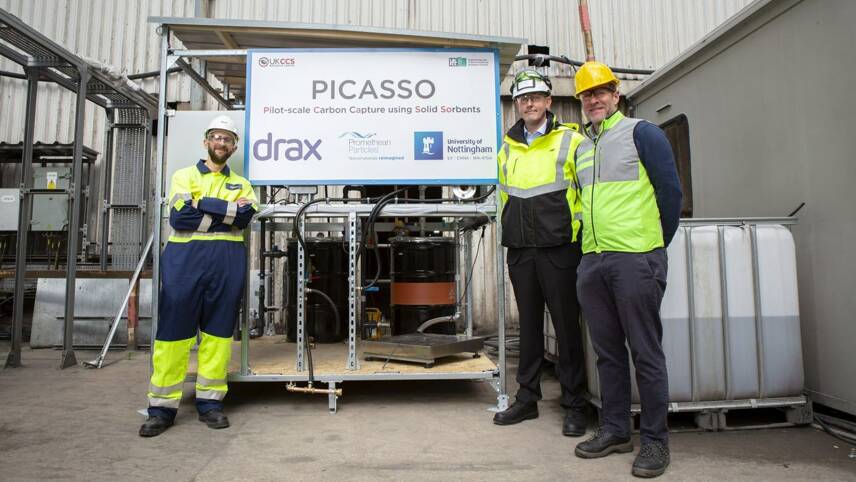Register for free and continue reading
Join our growing army of changemakers and get unlimited access to our premium content

(L-R) Drax's innovation engineer Dr Theo Chronopoulos; Promethean Particles CEO James Stephenson; and Professor Ed Lester from the University of Nottingham. Image: Drax
The energy company has partnered with Promethean Particles, which supplies metal-organic frameworks (MOFs) for carbon capture, and researchers at the University of Nottingham, to trial the innovative process.
The process involves feeding the emissions generated by burning biomass to generate electricity through a unit which separates out the CO2. The MOFs can then ‘soak up’ the CO2 in their porous structure. Some MOFs are made of up to 90% free space.
This approach mitigates the need for liquid solvents, which come with their own environmental challenges across the lifecycle. Drax will trial the process for two months and assess whether this approach is suitable for large-scale bioenergy with carbon capture and storage (BECCS) applications.
The University of Nottingham’s project lead for the initiative, Professor Ed Lester, said:“This is a fantastic opportunity to showcase how these solid adsorbents perform in an industrial setting. We know that this project is gathering a lot of interest across many industrial sectors that currently generate large amounts of CO2.”
Indeed, this week saw the Global Concrete and Cement Association confirming funding for British start-up MOF technologies, which is developing modular carbon capture plants using MOFs. They will be trialled at facilities operated by HeidelbergCement, Cementir Holding and Buzzi Unicem.
BECCS in context
Drax, specifically, first began capturing CO2 from its biomass processes in Selby, Yorkshire, in February 2019. The first emissions capture at the site was enabled by technology from C-Capture. Drax subsequently began using CCS technologies from Mitsubishi Heavy Industries.
Drax has now stated that it will be possible to begin installing CCS at scale at Selby in 2024 at the earliest. The company is hoping for at least one of the plant’s four units to reach carbon neutrality by 2027 using BECCS, and to become entirely ‘carbon negative’ by 2030.
Because CCS technologies are in their relative infancy on a commercial scale, and because sourcing biomass poses challenges around sustainable land-use, BECCS has attracted much controversy in environmental spheres in recent times. To the former point, the collective capacity of all operational CCS and CCU plants globally was estimated to be 38.5 million metric tonnes in 2021 – equivalent to less than 0.01% of global emissions.
The UK’s Climate Change Committee has stated that using CCS to some extent is a “necessity, not an option” for reaching net-zero by 2050. But it has estimated that, at most, CCS could address 3% of the nation’s emissions in 2030. This means that emissions reduction should be prioritised first and foremost.
As well as ensuring it chooses wisely on CCS, Drax has been repeatedly urged by environmental groups to stop labelling its electricity as ‘renewable’ and to do more to ensure supply chain sustainability. On the former point, December 2021 saw Citi downgrading Drax, because it does “not fundamentally see biomass as a sustainable source of energy.” Additionally, S&P Global removed Drax from its Clean Energy Index late last year.
On the latter point, 2019 saw plaintiffs from six countries file a lawsuit with the European General Court in Luxembourg, claiming that forest-grown wood shouldn’t be counted as a source of renewable energy under the EU’s 2018 Renewable Energy Directive (RED) II. In response, Drax produced a sustainable biomass strategy aimed at removing deforestation from its pellet supply chains.
For some groups, this move was not sufficient. Organisations including Cut Carbon Not Forests and Ember continue to press Drax to include emissions from importing biomass in its emissions accounting, to ensure that claims of ‘carbon-neutrality’ and ‘carbon-negativity’ are robust.
MPs on the Environmental Audit Committee (EAC) are currently scrutinising the UK Government’s approach to technologies which purport to be negative-emission, including BECCS. A statement released by the Committee last month reads: “While welcoming the Government’s commitment that BECCS technologies approved for use in the UK would use only sustainable biomass and would result in genuine net-negative emissions, the Committee is not currently reassured that nature and the environment will be fully protected from adverse effects.”


Please login or Register to leave a comment.